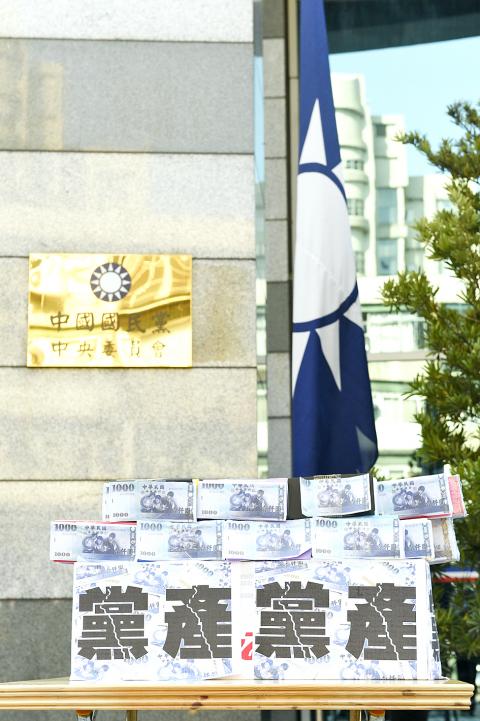The “C1 mark” appended to the Chinese Nationalist Party’s (KMT) assets and its affiliate organizations, which President Ma Ying-jeou’s (馬英九) government had removed nearly seven years ago, is likely to be reinstated after the Legislative Yuan’s Internal Administration Committee on Wednesday last week passed a motion in favor of the move.
In December 2005, the Ministry of the Interior, according to an executive order of the then-Democratic Progressive Party (DPP) administration, instructed land administration units to append the C1 mark to all national assets registered to the KMT and its affiliate organizations.
The intent was to remind corporate owners of the risks they faced when buying allegedly illegal assets the KMT was liquidating.

Photo: George Tsorng, Taipei Times
However, the C1 mark was removed after Ma was elected president in 2008; the Ma administration also closed down Web sites detailing the party’s disputed assets.
All related information was also removed from Web sites such as the National Property Administration.
DPP Legislator Yeh Yi-chin (葉宜津) said that the Ministry of the Interior was on April 3, 2009, informed by the Ministry of Finance to remove all C1 marks, and the interior ministry on April 13 that same year informed local government agencies to remove the C1 marks.
DPP legislators had since attempted to pass a motion in the legislature so that the interior ministry could reinstate the C1 mark on KMT assets, but they had been unable to do so due to the KMT’s majority in the Legislative Yuan.
DPP Legislator Chao Tien-lin (趙天麟) on Wednesday last week made a provisional motion on the matter during a meeting of the legislative committee, which was approved by more than half of the DPP members in the committee.
Launching a general inquiry into the assets alleged to have been illegally seized by the KMT and its affiliate organizations saw popular support, Chao said, adding that the C1 mark must be reinstated to prevent innocent people from buying such property.
“This would prevent further complications between the law and the issue of the party assets,” Chao said.
Chao said that the KMT’s allegedly illegal assets appropriated from national property had been liquidated from NT$6.6 billion (US$202.95 million) to NT$1 billion since the Ma administration’s removal of the C1 mark.
“The C1 mark must be urgently reapplied to all assets that are under the KMT’s name,” Chao said.
The committee had originally asked the interior ministry to reapply the mark immediately, but the ministry said it did not possess files on party assets, Chao said, adding that the committee had instead asked the Ministry of Finance to make known details of the KMT’s assets.

Tropical Storm Gaemi strengthened into a typhoon at 2pm yesterday, and could make landfall in Yilan County tomorrow, the Central Weather Administration (CWA) said yesterday. The agency was scheduled to issue a sea warning at 11:30pm yesterday, and could issue a land warning later today. Gaemi was moving north-northwest at 4kph, carrying maximum sustained winds near its center of up to 118.8kph and gusts of 154.8kph. The circumference is forecast to reach eastern Taiwan tomorrow morning, with the center making landfall in Yilan County later that night before departing from the north coast, CWA weather forecaster Kuan Shin-ping (官欣平) said yesterday. Uncertainty remains and

SEA WARNING LIKELY: The storm, named Gaemi, could become a moderate typhoon on Wednesday or Thursday, with the Taipei City Government preparing for flooding A tropical depression east of the Philippines developed into a tropical storm named Gaemi at 2pm yesterday, and was moving toward eastern Taiwan, the Central Weather Administration (CWA) said. Gaemi could begin to affect Taiwan proper on Tuesday, lasting until Friday, and could develop into a moderate typhoon on Wednesday or Thursday, it said. A sea warning for Gaemi could be issued as early as Tuesday morning, it added. Gaemi, the third tropical storm in the Pacific Ocean this typhoon season, is projected to begin moving northwest today, and be closest to Taiwan on Wednesday or Thursday, the agency said. Today, there would likely

DISRUPTIONS: The high-speed rail is to operate as normal, while several airlines either canceled flights or announced early departures or late arrivals Schools and offices in 15 cities and counties are to be closed today due to Typhoon Gaemi, local governments announced last night. The 15 are: Taipei, New Taipei City, Taoyuan, Tainan, Keelung, Hsinchu and Kaohsiung, as well as Yilan, Hualien, Hsinchu, Miaoli, Chiayi, Pingtung, Penghu and Lienchiang counties. People should brace for torrential rainfall brought by the storm, with its center forecast to make landfall on the east coast between tonight and tomorrow morning, the Central Weather Administration (CWA) said. The agency issued a sea warning for the typhoon at 11:30pm on Monday, followed by a land warning at 11:30am yesterday. As of

CASUALTY: A 70-year-old woman was killed by a falling tree in Kaohsiung as the premier warned all government agencies to remain on high alert for the next 24 hours Schools and offices nationwide are to be closed for a second day today as Typhoon Gaemi crosses over the nation, bringing torrential rain and whipping winds. Gaemi was forecast to make landfall late last night. From Tuesday night, its outer band brought substantial rainfall and strong winds to the nation. As of 6:15pm last night, the typhoon’s center was 20km southeast of Hualien County, Central Weather Administration (CWA) data showed. It was moving at 19kph and had a radius of 250km. As of 3pm yesterday, one woman had died, while 58 people were injured, the Central Emergency Operation Center said. The 70-year-old